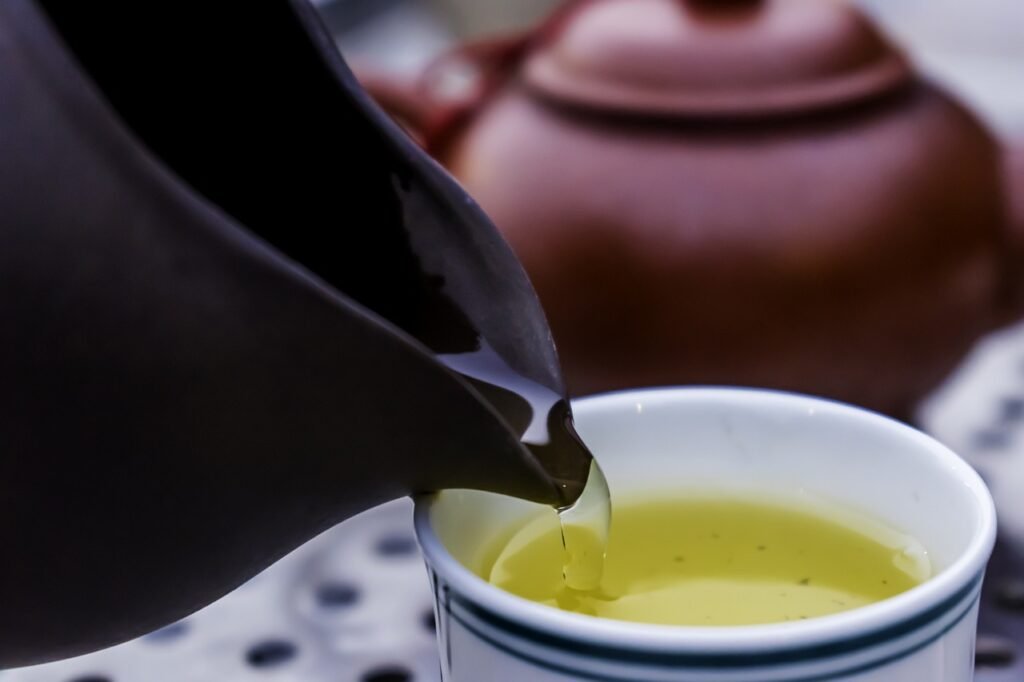
Intro
Are you a fan of chai tea? Have you ever wondered about the health benefits of this popular beverage? In this blog post, we will delve into the truth about chai tea and explore its potential impact on your health.
From its nutritional profile to its role in digestive health, immune system support, heart health, mental well-being, weight loss, and metabolism, we will uncover the many benefits of chai tea.
So grab a cup of your favorite chai blend and let’s explore the health benefits of this delicious and aromatic beverage.
Unveiling Chai Tea – What Exactly Is It?
At its core, chai tea, known in many places simply as masala chai, is a beloved beverage that has woven itself into the fabric of various cultures, most notably in India where it originated.
This aromatic drink is crafted from a base of black tea, which is then infused with a rich tapestry of spices that may include, but are not limited to, cinnamon, cardamom, ginger, cloves, and black pepper.
These ingredients come together to create a beverage that is both invigorating and comforting, offering a unique taste experience that is distinct from other teas.
The preparation of chai tea can vary widely, reflecting regional preferences and individual tastes.
Some may prefer their chai with a stronger emphasis on certain spices, while others might enjoy it with more milk or sweeteners.
The versatility of chai tea allows it to be customized in countless ways, making it a personal and communal experience all at once.
What sets chai apart from other beverages is not just its blend of flavors but also the traditional methods used in its preparation. Often, the tea and spices are simmered together, allowing the flavors to meld beautifully.
Milk is then added to create a creamy, soothing concoction, with sweeteners introduced to enhance the natural sweetness of the spices.
This careful process results in a drink that is more than just a tea—it’s a celebration of flavor, tradition, and healthful benefits, offering a comforting warmth that can be enjoyed at any time of the day.
The Nutritional Profile of Chai Tea

Chai tea stands out not just for its complex flavor profile but also for its impressive array of nutritional benefits, primarily derived from its rich content of antioxidants.
The foundation of chai tea, black tea, boasts a substantial amount of polyphenols.
These antioxidants play a crucial role in combating oxidative stress within the body, contributing to overall health and wellness.
Moreover, the ensemble of spices that chai tea is famous for—including cinnamon, cardamom, ginger, cloves, and black pepper—adds not only depth to its flavor but also a considerable nutritional boost.
Each spice brings its own set of healthful compounds to the brew. Cinnamon, for instance, is well-regarded for its anti-inflammatory properties and ability to regulate blood sugar levels.
Cardamom and ginger are celebrated for their digestive benefits, helping to soothe upset stomachs and stimulate digestion.
Cloves, packed with antioxidants, contribute to immune health, while black pepper, often a catalyst in enhancing the absorption of beneficial compounds, ensures that the body maximizes the intake of these nutrients.
Additionally, chai tea can be a low-calorie beverage choice, especially when prepared without added sugars and with low-fat or plant-based milk.
This makes it an excellent option for those monitoring their caloric intake without wanting to compromise on taste or the pleasure of a warm, comforting drink.
In essence, the nutritional profile of chai tea encapsulates a blend of antioxidants, essential oils, and minerals contributed by its constituent spices and black tea base, making it a potentially healthful addition to one’s diet.
Benefits of Chai Tea
Chai Tea’s Role in Digestive Health
The array of spices found in chai tea, notable for their extensive use in traditional healing practices, have remarkable effects on the digestive system.
Ginger, one of the key ingredients, is renowned for its ability to alleviate nausea and promote the movement of food through the digestive tract.
Cardamom, another essential component, is known for its carminative properties, which can help relieve symptoms like bloating and gas, offering a soothing effect to those experiencing discomfort.
Furthermore, the presence of black pepper in chai tea enhances the bioavailability of its beneficial compounds, facilitating more effective digestion and nutrient absorption.
This synergy of spices not only enriches the flavor profile of chai tea but also significantly contributes to its digestive health benefits.
The warmth generated by these spices upon consumption also plays a pivotal role, as it can help to relax the digestive muscles, further easing digestion.
The inclusion of these spices in chai tea makes it a particularly favorable choice for individuals seeking natural remedies to improve their digestive health.
By incorporating chai tea into one’s diet, it’s possible to enjoy a delightful beverage while also harnessing the digestive benefits offered by its rich, spice-laden composition.
It’s an enjoyable way to stimulate digestion and soothe the digestive tract, embodying a perfect blend of pleasure and health benefits.
Chai Tea to Boost Your Immune System
Chai tea, with its rich blend of spices and black tea, may play a supportive role in bolstering the immune system.
The key ingredients in chai, such as ginger and cloves, are not only aromatic and flavorful but also come with immune-enhancing properties.
Ginger is celebrated for its anti-inflammatory and antimicrobial effects, helping to protect the body against pathogens.
Cloves, similarly, are packed with antioxidants and have antimicrobial properties, which can contribute to a more robust immune response.
The antioxidants found in black tea work in harmony with the spices to help reinforce the body’s defense mechanisms against external invaders and infections.
This dynamic combination can aid in fortifying the body’s natural immunity, making chai tea a potential ally during flu season or when you feel the need to boost your immune health.
Additionally, the warm, comforting sensation provided by a cup of chai can be particularly soothing during times of illness, providing a gentle lift to the spirits as well as physical benefits.
While chai tea should not be considered a cure-all, its consumption might offer supplemental support to a well-rounded diet aimed at maintaining immune health.
Incorporating chai tea into your routine could be a pleasurable way to contribute to your body’s overall defense system, enjoying the flavorful depths of each sip while tapping into the natural protective properties of its components.
Chai Tea and Heart Health
Exploring the connection between chai tea and heart health reveals promising insights into how this flavorful beverage can play a part in a heart-healthy lifestyle.
The potent combination of black tea and spices such as cinnamon and cloves contributes significantly to the cardiovascular benefits of drinking chai tea.
Black tea’s polyphenols are instrumental in reducing the absorption of bad cholesterol (LDL), a key factor in the prevention of plaque formation in the arteries.
This action directly impacts heart health by promoting cleaner and more flexible blood vessels, thus reducing the risk of heart attacks and strokes.
Furthermore, the antioxidants in cinnamon and cloves, prominent spices in chai tea, offer additional support in fighting off inflammation within the body, including the cardiovascular system.
Inflammation is a known precursor to many heart-related issues, and managing it is crucial for maintaining heart health.
These spices also aid in improving the function of blood vessels, enhancing blood flow and further contributing to cardiovascular wellness.
The cumulative effect of these ingredients within chai tea suggests a positive influence on blood pressure regulation and overall heart function.
Regular consumption of chai tea, as part of a diet that is mindful of heart health, may assist in managing factors that contribute to heart disease.
It’s important to note, however, that enjoying chai tea for its heart benefits should also come with a consideration for its preparation—opting for minimal added sugars and healthier milk options can amplify its positive impact on heart health.
The Impact of Chai Tea on Mental Well-being
Delving into the serene world of chai tea reveals its potential to significantly soothe and uplift the mind.
This effect is not merely due to its warmth and comforting essence but also to the intricate blend of spices that are known to possess natural mood-enhancing properties.
The ritual of preparing and savoring a cup of chai can itself be a mindful practice, offering a momentary pause from the hustle of daily life and allowing for a space of calm reflection.
The key spices in chai tea, including cinnamon, cardamom, and ginger, have been linked to cognitive benefits such as improved alertness and a reduction in stress.
Cinnamon, for instance, has a comforting scent that can instantly elevate mood and alleviate feelings of irritability.
Cardamom‘s sweet and soothing aroma can help clear the mind, enhancing mental clarity.
Meanwhile, ginger is known for its invigorating properties, which can help combat feelings of lethargy and depression.
The act of drinking chai tea, with its harmonious symphony of flavors and scents, stimulates the senses in a way that can distract from the stresses and strains of everyday life.
It’s this sensory engagement that contributes to a heightened sense of well-being, making chai tea more than just a beverage—it’s a therapeutic ritual that nurtures mental health.
By integrating chai tea into moments of rest and reflection, it becomes a tool for achieving a more peaceful state of mind, highlighting its role not just in physical, but in emotional and psychological wellness.
Weight Loss and Metabolism – Can Chai Tea Make a Difference?
In the realm of weight management and metabolic health, chai tea emerges as a potential ally.
Its unique composition, blending black tea with a medley of spices like cinnamon, ginger, and cardamom, offers more than just flavor; it can actively support metabolic processes.
Cinnamon, in particular, is recognized for its potential to regulate blood sugar levels, which plays a vital role in managing hunger and reducing sugar cravings. This regulatory effect can aid in preventing the spikes and dips in blood sugar that often lead to snacking and overeating.
Ginger and cardamom, other key components of chai tea, contribute their own metabolic benefits.
Ginger is noted for its thermogenic properties, meaning it may help increase the body’s temperature and, consequently, its calorie-burning rate.
Similarly, cardamom has been linked to enhanced metabolic activity, suggesting a possible boost in fat burning.
Incorporating chai tea as a mindful choice in a diet can provide a comforting, low-calorie alternative to high-calorie or sugary drinks.
For those looking at weight loss or weight management strategies, swapping out less healthy options for a cup of chai can be a simple yet effective adjustment.
Additionally, the ritual of enjoying a warm cup of chai can offer a moment of pause, reducing stress and potentially lowering the likelihood of stress-induced eating.
Opting for chai tea with minimal added sugars and considering plant-based milk alternatives can further align this beverage choice with weight management goals, ensuring that every sip contributes positively to one’s health journey.
How to Incorporate Chai Tea into Your Diet for Maximum Health Benefits
Embracing chai tea as a part of your daily routine can offer a flavorful journey towards enhancing your health.
Start by substituting chai tea for beverages that are high in caffeine, sugar, or artificial ingredients.
This simple switch can reduce your intake of empty calories and provide a boost of antioxidants and nutrients.
For those accustomed to morning coffee or afternoon sodas, a cup of chai offers a gentle lift without the harsh crash.
Consider preparing your chai with water or a mix of water and milk to keep calories in check. Plant-based milks like almond, oat, or soy can add a creamy texture without the added fats present in traditional dairy milk.
When it comes to sweetening your chai, opt for natural sweeteners like honey or maple syrup in moderation, or explore the inherent sweetness of the spices by allowing them to take center stage.
Get creative with your chai by incorporating it into smoothies, oatmeal, or even baking recipes for an aromatic twist. Not only will this diversify your intake of chai tea, but it will also introduce its healthful properties into various aspects of your diet.
By consciously integrating chai tea into your daily habits, you can savor the rich flavors while nurturing your body’s well-being.
Pin this post to read later



